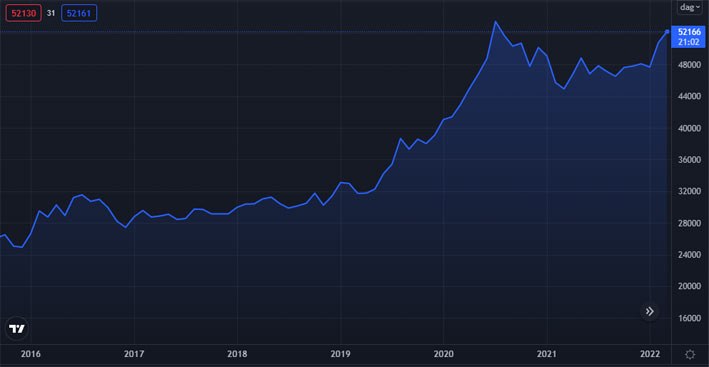Taxation of Sovereign Gold Bond (SGB) | Tax Implications

Inflation being the investors' primary concern, gold is a precious component of an inflation-hedge basket. It is a hedging tool against inflation. Its price varies according to inflation numbers.
The cost of gold increases with an increase in the cost of living. It is less likely to be credible for short-term investment. However, gold is regarded as a safe-haven asset. It is ideal for investors when the interest rates drop or inflation rises.
Gold is often seen as a valuable asset during difficult times, and it has given positive results over time. There are multiple gold investment options are available in India like Sovereign Gold Bond (SGB), Gold ETF (exchange-traded fund), Digital Gold, etc. All of these options are pretty easy to invest in and free from making & other charges. As an investor one should know about the taxability of digital golds. In this article, I’m going to discuss SGB and its taxability.
India is a country where people have a deep connection with gold. It is regarded as an essential asset. Indian households have about $1 trillion worth of gold. They keep it in the form of jewellery, coins, and bars.
Keeping real gold comes with lots of hassle. The government introduced the Gold Bonds scheme in November 2015, allowing investors to keep gold in dematerialized form. It avoids the hassles that are common in physical gold.
Understanding The Basics of The Sovereign Gold Bond Scheme:
The RBI issues the gold bond. They are available on several banking channels, other authorized agents, and post offices.
The gold bonds are based on grams of gold. The rate of the gold bond issue is defined at the moment of each tranche established on the average price. The price is generally determined by the RBI little less than the market price so that it attracts buyers. Moreover, the bonds are formed in grams of gold. It will not affect the actual holding of gold.
Recommended Article: Taxation on Cryptocurrency in India
What keeps changing? The value of gold changes according to the market price of gold. Precisely, this is just like having physical gold and taking part in the price activity without the problem of storage. You also do not have to go through the conversion of the form of gold which generally happens in physical gold.

Gold Price Growth Chart 2016 - 2022
Who Can Invest?
Indian residents comprising individuals (on behalf of a child, jointly with another person), Trusts, HUFs, charitable institutions, and Universities are entitled to invest in such bonds.
Non-Resident Indians (NRIs) cannot participate in the SGBS.
Period Of Bond
The period of the Bond is for eight years. The exit option is available from the 5th year that will be exercised on the interest payment dates. After completing the 5th year, you can redeem the gold bond on the 6th, 7th, or 8th year. 8th year is the maturity year.
The depository/RBI will inform the investor about the maturity of the SGB a month before its maturity.
Interest Rates
The SGB extends a regular interest income to its investors. At present, the rate of interest is 2.5% per annum. It is offered on a half-yearly frequency.
According to Income Tax Act, Section 193 (iv), 1961, no tax can be deducted on interest paid on government security. Henceforth, the TDS is not relevant to interest income.
The interest income chargeable tax is appropriate to every bondholder according to the normal income tax slab.
Minimum And Maximum Investment
For SGB, you have to purchase at least one gram of gold which is the minimum investment. The maximum investment can be up to 4 kgs per person every fiscal year, April-March. This applies to an individual and HUF.
The limit for trust is 20 kgs. The government also notifies it during every fiscal year.
When the SGB scheme is availed in joint holding, the limit will be 4 kg for the first applicant.
Payment Option
Payment is accepted in cash (Indian rupees), demand draft, electronic banking, or check. Cash is acceptable up to Rs 20,000.
When the payment is made through a demand draft or check, it will be drawn in favour of the receiving office.
Why Is the Sovereign Gold Bond Scheme Attractive to Investors?
The sovereign gold bond scheme has several reasons to attract investors. Let's discuss a few of them.
The gold bond scheme can be held in physical certificates. It can also be stored in your existing Demat account. This is much easier than having physical gold that carries the risk of storage, theft, and form conversion.
The sovereign gold bond scheme gives an annual interest of 2.5%, which is an added advantage.
When you buy physical gold, you are not entitled to enjoy any interest in it. However, in the case of gold bonds, you get a whopping 2.5% interest every year. This is not just confined to the interest, but also you get the advantages of gold price movement.
A most common question is How to Buy Sovereign Gold Bonds Online? Gold bonds can be bought through the existing online trading account as well. Apart from this, you also get a discount of rupees 50 or gram when you purchase gold bonds online and pay digitally. This will, in hand, the yield on gold bonds.
You can buy gold bonds in multiple names. A person can buy 4 kg of gold bonds every year. This means that if you have two members in your family, then your household can get up to 8 kg of gold every year. If you have three members in your family, you can get 12 kgs of gold every year.
Gold bonds have a significantly less denomination of 1 gram of gold. Therefore, this makes it very affordable for middle-class investors. They also give them a chance to purchase gold as an asset.
Tax Implications to Buy Sovereign Gold Bonds
Interest Income
The gold bonds are formed on grams of gold. The investor will directly receive the interest in their bank account. This interest is fully taxable. It will be added to the investor's income and is subject to be taxed according to the marginal slab rate. Yet, no TDS (tax deducted at source) will be relevant to the interest paid.
The sovereign gold bond scheme gives an annual interest of 2.5%, which is a great advantage. When you buy physical gold, you don't enjoy an interest in it. However, in the case of gold bonds, you get a 2.5% interest every year.
The taxable income will be semi-annual income for you. Therefore, for an individual with the 10% tax bracket, the post-tax return will be 2.25%. For the 20% tax bracket, it is a 2% post-tax return. It will be a 1.75% post-tax return for the 30% tax bracket. This income will be under Income from other sources.
Taxation of Gold Bond India must be completed according to the laws. You have to pay the applicable taxes accordingly, like your Bank FDs.
Redemption of Bond
As talked above, you can redeem it after the 5th year. You can redeem it on the 6th,7th, and 8th year.
If the bond price is 3000 at the time of buying and 3500 at redemption, you will profit rupees 500. The capital gain arising from redemption by an individual is free from tax.
The capital gain from the redemption at the 6th, 7th and eighth year is not taxable. The redemption is only for individual taxpayers and not for other categories like trusts, HUF, etc.
Also, Read Nifty 50 Vs. Nifty Next 50 Index Fund | Which is Better?
Capital Gain Tax on SGB
Gold Bonds give good income. This income is taxable. Let's assume that you buy in March 2022 and sell it in March 2023. In this situation, profit or loss will be seen as a capital gain. If these gold bonds are sold in the secondary market before maturity, there can be two possibilities: one is STGC, and another one is LTCG.
The gold bonds mature over eight years. If you buy these bonds and keep them till maturity, you will not have to pay tax for the capital gains.
Premature withdrawal is valid from the 5th year onwards. If you want to go for premature withdrawal, you can contact the stock-holding corporation, concerned bank, agent, or post office 30 days before the coupon payment date.
You can request premature redemption at least one day before the coupon payment date to the concerned bank or post office. The amount will be transferred to the customer’s bank account given during applying for the gold bond.
You can also buy or sell gold bonds through the stock exchanges.
STCG - Short Term Capital Gain
The Short Term Capital Gain is the gain obtained within the holding period of fewer than three years. According to the normal income tax slab, it is chargeable.
In case of a capital gain, you will be taxed according to your tax slab.
LTCG - Long Term Capital Gain
Long-term capital gain is obtained with a holding period of 3 or more years. The capital gain, in this case, will be taxed at 20% (with indexation). If you are not using the indexation benefit, the long-term Capital gain will be taxed at 10%.
TDS is not applicable here. The investor is responsible for paying the taxes keeping the rules in mind.
Sovereign Gold Bonds - Pros and Cons
Pros
- Investing in Sovereign Gold Bonds gives 2.5% interest pay-outs by the government. It is given half-yearly.
- Keeping gold in physical form comes with a threat. It poses the risk of getting stolen. The Sovereign Gold Bond is in paper form and digitally recorded. The investors can be tension free from potential loss or theft. Therefore, it is one of the best forms of investment.
Cons
- The lock-in period can be an issue. For eight years, you cannot redeem the bond in the first five years. This is still a benefit because you will be saved from the fluctuations in market prices.
- The price of gold is turbulent and relies on the international market's volatility. An investor can face capital loss due to volatility. This happens when the buying price is more than the redemption price of gold. The lock-in period of 8 years minimizes this risk.
Key Takeaways
Gold appears to be losing its importance with several upcoming means of investment, yet the good bright old yellow metal will always be precious.
Sovereign Gold Bonds (SGB) is a famous form of investment in the market where you can purchase gold in the form of bonds. The Indian government took this initiative in 2015 to attract people toward digital investment. You can also keep Sovereign Gold Bonds as collateral for loans.
SGB extends several benefits like safety, independent pricing, regular income, purity, etc. Nevertheless, what makes it more interesting is the taxation benefit it gives to the investors. A 2.5 % interest provides quick profit during price appreciation. You can invest in SGB for first-hand experience.
Let us know in the comment section below if you want to know anything else about the Taxation of Sovereign Gold Bond.
FAQs
Is TDS (TDS) applicable on SGB (Sovereign Gold Bonds)?
No. TDS (Tax Deducted at Source) is not applicable on the Sovereign Gold Bonds.
What is the taxability on premature redemption of SGB?
Capital gain tax on maturity is exempted. Although, in the case of premature redemption, the capital gains will be taxed at 20% post indexation if you redeem after 5 years.
What is the taxability of selling SGBs over the secondary market?
Selling SGBs within 1 year, the tax will be applied according to the income-tax slab. Otherwise, LTCG (Long-Term Capital Gain) tax will be applied at the rate of 10%.